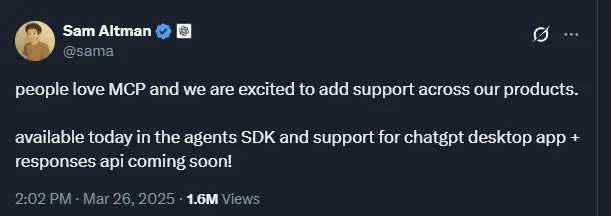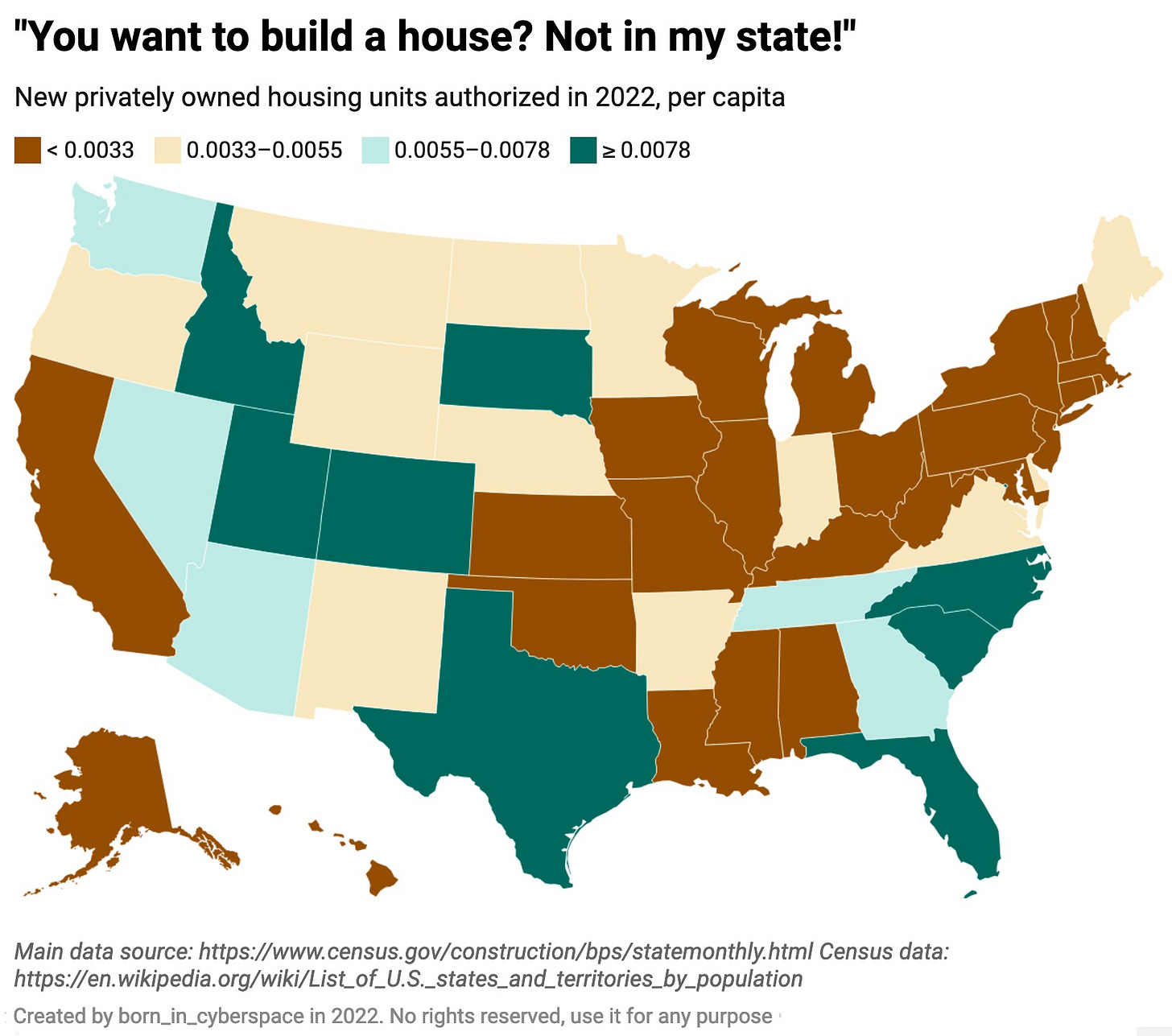ZD 25.13: MCP Makes AI Magical
Who cares about Studio Ghibli when you can have Model Context Protocol?
In the issue: Waymo crashes. Underbuilt blue states. Say no to stop loss orders. Multimodal is here. Learning to unlearn. MCP makes AI Magical.
The Distilled Spirit
The World We Live In
🚗 Waymo Crashes (Understanding AI)
Waymo is coming to DC, making Waymo crashes a bit more top of mind to me. Thankfully, the safety record indicates that 3 of 38 crashes might have been Waymo’s fault. Are robots better drivers than man?
🏢 Red States Build Blue Stats Don’t (Noahpinion)
Blue states have stopped allowing building. The cumulative effects are adding up in population migration and ultimately congressional apportionment. High costs of housing are driving people to red states where building is easier. Jobs are being created where people can build the factories. It is time to let go and build.
💥 The Ukraine War Drags On (Big Serge Thought)
The Russo-Ukrainian war is more than three years old. Ukraine has retreated from the Kursk salient. The Russians are advancing on three fronts in the Donbas. Ukrainian support is not what it used to be.
🚢 The CCP Is Winning the Ship Wars (CSIS)
China State Shipbuilding Corporation is now the world’s biggest shipbuilder. The US accounts for 1% of global shipbuilding. The CSIS shares a strongly worded warning about China is leaping ahead in capabilities on this front.
Market Reality Strategy
🤚 Stop With the Stop Loss Debate ( moontower: a stoner dad explains options trading to his kids)
Moontower is a former market making options trader who does an amazing job explaining a lot of financial concepts. He breaks down what stop loss orders are and are not.
💰 Using Puts For Benefit (The Simple Side)
If you have a portfolio the last few weeks have been trying. Put options are a good way to enact an insurance policy on some of your holdings.
AI but not MCP
🦜 The Parrot can Talk AND Draw (Nate’s Substack)
Truly multimodal AI models made everything Ghibli. Models where the text and the image engine live in the same latent space, enabling much more natural interactions between prompts and pictures. Nate explains what that means details what Google and OpenAI released this week.
🤖 What Are AI Agents (Enterprise AI Trends)
Everywhere you look there is an AI Agent. The free portion of this essay is a good explainer of what that term means and what differentiates an AI agent from an AI workflow. MCP and Agents go hand in hand, more on MCP below.
🧬 On the Biology of a LLM (Anthropic)
Leading large language model laboratory Anthropic takes a stab at explaining how Claude 3.5 Haiku thinks. This is a very, very deep but very interesting rabbit hole. Worth the dive but bring rope.
Cognition and Culture
🗻 Polymathic Thinking (Polymathic Being)
The speed of change is astounding. Things change so much and so fast that the key learning ability might be the ability to unlearn and relearn rather than merely learning alone.
🧠 Day Optimization Cognitive Hackery (Personal Math with Greg & Taylor)
Three different ways to think about task prioritization, day structure and finding time that are very helpful.
⛔ I Won’t Connect My Dishwasher (Jeff Geerling)
Manufacturers are hiding functionality behind cloud apps rather than spring for a few more buttons. Cloud apps that require your data to work. These cloud apps could go poof rendering your device inoperable. These devices are potential security risks on your network. Do you want to patch a dishwasher? Caveat emptor.
MCP Makes AI Magical
If you weren’t building AI tools and integrations, you might think the week’s biggest AI story was Studio Ghibli images. No arguments, it was cool, and I agree with Ethan Mollick: the underlying multimodal technology marks a major advancement.
Sometimes, however, advances in models are overshadowed by advances in tools. The most important @sama tweet of the week was this one:
If you are not familiar with it, MCP is Model Context Protocol. It is an open set of standards on how applications provide context to LLMs. You can think of MCP as a universal translator that lets your AI assistant securely communicate with the rest of your digital tools — like giving ChatGPT or Claude a standardized way to fetch information, complete tasks, and push updates. This ability to connect AI to datasets and tools addresses one of the biggest limitations of current AI systems. Hallucinations, the boogeyman of most AI operations, are often a function of lack of context. MCP allows a user to provide much more context around requests. It can share vetted information with the model, making answers much more accurate.
What to do with the results of your AI conversations is another challenge. These days, AI output is still delivered via copy and paste. MCP will allow for your chatbot to talk more directly with other tools. To compose emails and Slack messages, to update that CRM system or create the tasks in the ticketing system. You can read and interact with the Word document, and the AI can patch the updates directly into it.
To make this work you use two kinds of applications -- MCP Clients and MCP Servers. You can think of MCP Clients as the AI's voice — the interface you interact with — and MCP Servers as its hands, doing the actual work like retrieving files, sending messages, or updating databases. MCP Clients are generally run through MCP Hosts -- chat applications like Claude (and soon to be joined by ChatGPT) or coding tools like Cursor.
There are a ton of MCP Servers for the hosts to leverage. Accessing the filesystem or running a browser locally might be one scenario. They can also act as proxies out to other tools. You can do things like access Slack, Supabase or Airtable for example. At a glance this feels insecure -- how can an AI read from your disk? But since you create the servers, you can determine how much access there is and remain in control of the keys. It is actually a great way to get AI into these sources of information securely.
Thanks to MCP standards, developers can write a single piece of code that works across many tools — a big improvement over one-off implementations and integrations. MCP servers are surprisingly easy to implement — many of the ones found in the master list are only a couple of hundred lines of code wrapping existing APIs for MCP access. Hosts require a bit more investment, but with a critical mass of MCP servers, it makes the payoff worth the investment, as OpenAI admitted. I would expect to see support for the protocol dramatically increase in the coming weeks and months.
For a very good technical introduction, watch this video where Mahesh Murag of Anthropic explains their work.
Still Not Quite Consumer Grade
As things stand today, the MCP experience is best suited for developers, AI tinkerers, and internal tooling teams experimenting with agents or local AI assistants. The protocol is still in its early days, and the tools are rapidly evolving to support it. At the time of writing, most tools still require development toolchains to install and run. Configuration in Claude is via hand-editing a text file. Windows integration is still rough — it’s very much a Mac-centric ecosystem right now. All that said, I expect this to improve rapidly as this protocol takes off.
One of the most important signs of lift-off is the tool vendors lining up around the service. Support for MCP is gaining momentum, with a steady stream of new announcements. This week, Zapier announced MCP integration, enabling a lot of no-code custom integrations. Apify, a very good web tools vendor, also announced a wrapper around their tens of thousands of tools. Cloudflare has jumped on the bandwagon as well. I expect many competitors and partners are not far behind.
Until the tools mature, using MCP requires some text file editing and command-line know-how. But if you can stomach that, it is really worth it. After my own configuration battles, I finally got Claude talking with Supabase. It was astounding — one of those computing experiences I have had a few times in life. As the tool queried the schema, loaded the data, and interpreted the contents, I realized I was looking at the future of work. Making interactive visualizations in minutes without really touching the data in more than a theoretical sense or writing a line of code was magical. MCP is going to be a major part of the AI story going forward. Once this friction disappears, MCP won’t just support AI — it will enable the next generation of intelligent, action-oriented systems. It will give AI a universal remote control, and I am very excited.
Musical Coda
Trying out a little smoky jazz tune this time. Enjoy.
The Look
We are not building in blue states.
Did you enjoy reading this post? Hit the ♥ button above or below because it helps more people discover great Substacks like this one and it helps train your algorithm to get you more posts you like. Please share here or in your networks to help us grow!





